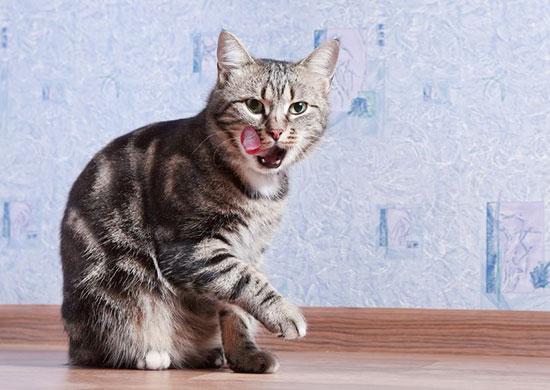This content is archived from the Feline Nutrition Foundation
A Cat's Food Allergies and Intolerances Explained
- Updated: Tuesday, April 30, 2019 07:14 PM
- Published: Sunday, January 01, 2012 04:15 PM
- Written by Elisa Katz, DVM
 My cat almost always vomits after I feed her anything with beef in it. When I mentioned to a friend that I thought he was allergic to beef, she corrected me and said that vomiting was a sign of food intolerance, not a food allergy. Now I'm confused. What's the difference between the two? If they are two different things, what are the signs to look for in each case?
My cat almost always vomits after I feed her anything with beef in it. When I mentioned to a friend that I thought he was allergic to beef, she corrected me and said that vomiting was a sign of food intolerance, not a food allergy. Now I'm confused. What's the difference between the two? If they are two different things, what are the signs to look for in each case?
Food allergy is a specific type of reaction by the body to an allergen, usually a protein in the food. It is defined as "an adverse reaction to a food or food additive with a proven immunologic basis."¹ This means that it must involve the immune system. In most cases, allergies involve a certain type of antibody called Immunoglobulin E. Food intolerance is "a non-immunologic adverse physiologic response to a food or food additive."² This means that intolerance does not involve the immune system. Intolerances involve metabolic effects which alter processes in the body, pharmacologic, drug-like or toxic effects of offending ingredients.³
What makes it a bit difficult to distinguish between the two is that vomiting can be a sign of either condition. With food allergy, however, there likely will be signs outside of the gastrointestinal tract. You should see things like itchiness, fur loss from licking, scabs from scratching, red bumps or irritated areas particularly on the face, ears, and abdomen. If your cat does not have any of these other signs and seems to vomit every time he eats the beef food, he is more likely to have intolerance.
 I would not recommend condemning beef from his diet, however. When proteins are cooked, their structure is altered. This can be evidenced in the difference between a raw egg and a cooked egg or the different appearance and texture of raw versus cooked meat. This alteration in structure may make a non-allergenic raw protein become allergenic now that it is cooked.⁴ So, you may be able to feed him raw beef eventually.
I would not recommend condemning beef from his diet, however. When proteins are cooked, their structure is altered. This can be evidenced in the difference between a raw egg and a cooked egg or the different appearance and texture of raw versus cooked meat. This alteration in structure may make a non-allergenic raw protein become allergenic now that it is cooked.⁴ So, you may be able to feed him raw beef eventually.
To help determine what is really going on, I encourage you to seek advice from your veterinarian, as there are many other reasons your cat might vomit. I would also recommend taking a good look at all of the ingredients in the food that you are feeding him. What are the additives? Are there any artificial colors, vague ingredients such as "natural flavor," chemical preservatives such as BHA or BHT or undefined by-products? Is it a dry cat food with carbohydrates? Any one of these may be the culprit and not necessarily the beef.
Once your veterinarian has ruled out other causes of vomiting, he or she may recommend an elimination diet. This means that you eliminate certain protein sources, which can include grains such as wheat and corn, for at least an eight-week period. Most elimination diets consist of a somewhat novel protein source, i.e. one that your cat has not eaten before. You can easily accomplish this without using a prescription diet. I recommend either a gradual switch to a raw or partially raw cat food diet or a high-quality, grain-free canned diet. This is because most cats have some degree of intolerance to the high amount of carbohydrates in the commercial diets available, including most if not all prescription diets.
Additional Reading
Answers: Raw Cat Food for My Cat's Mystery Allergy?
Answers: What Dry Food Does to Your Cat's Gut
You will need to read ingredient labels thoroughly to ensure that there is no beef at all in the food. Avoid any treats that mention beef or vague ingredient that could be beef, such as something described as "animal digest" or "meat by-product." You must avoid the suspected allergen food for at least eight weeks to ensure it is out of the cat's system. If he stops vomiting completely, you can either continue avoiding beef or attempt to add it back in and see if the vomiting returns.
In any case, as you can see, food allergy and intolerance are much more complicated than they may first seem. With a little diligence and patience, you should be able to determine which it is that is afflicting your kitty.
Note: Feline Nutrition provides feline health and nutrition information as a public service. Diagnosis and treatment of specific conditions should always be in consultation with your own veterinarian. Feline Nutrition disclaims all warranties and liability related to the veterinary advice and information provided on this site.
Dr. Elisa Katz, DVM, is a graduate of Ohio State University and is the owner of Natural Pet Animal Hospital in Bourbonnais, Illinois. She practices holistic and integrative medicine focusing on proper diet and nutrition. Dr. Katz shares her home with four kitties and one dog.
1. Stephen J Ettinger and Edward C Feldman, Textbook of Veterinary Internal Medicine, 4th ed, vol. 1, W.B. Saunders Co, 1995, 258-262.
2. Ettinger and Feldman, 258-262.
3. Larry P Tilley and Francis WK Smith, Jr, The 5-minute Veterinary Consult: Canine and Feline,2nd ed, Lippincot Williams & Wilkins, 2000, 720-721.
4. Victoria Emerton, Food Allergy and Intolerance: Current Issues and Concerns, no. 285, Royal Society of Chemistry, 2000, 150-151.




